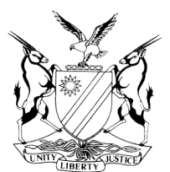MUNSU J:
Background
[1] I refer to the parties as they are cited in the main application. The applicant is Mr Hendrik Christian an adult male.
[2] The first respondent is the Honourable Justice Schimming-Chase, while the second respondent is cited as ‘Judge Chief Peter Shivute’, the Chief Justice, who is constitutionally tasked to supervise and exercise responsibility over the judiciary. [3] The applicant instituted proceedings against the respondents, in which he seeks a number of orders, including one declaring the orders made by the first respondent in cases HC-MD-CIV-MOT-GEN-2021/00005 and HC-MD-CIV-MOT-GEN-2020/00446 to be null and void and of no legal effect. He further asks for an order compelling the second respondent to take reasonable steps to monitor the norms and standards for the exercise of judicial functions in order to avoid impropriety. [4] The respondents filed their opposition, albeit out of time. As a result, they seek condonation for the late filing of their notice of intention to oppose. The applicant opposes the application for condonation. In his answering affidavit, the applicant raised a point in limine that the legal practitioners for the respondents lack the necessary authority to represent the respondents. [5] The court determined the point in limine, and ultimately dismissed it. The applicant then filed an application for leave to appeal to the Supreme Court. As directed by the court, the parties filed their respective papers in the application for leave to appeal. [6] At the hearing of the application for leave to appeal, on 12 April 2023, the applicant submitted that he was no longer seeking leave to appeal. The reason put forth is that, he managed to get hold of the handbook for the office of the Government Attorney and uploaded same on e-justice. According to him, a careful reading of the handbook, together with the Government Attorney Proclamation of 1982 as well as s 33 of the Legal Practitioner’s Act reveals that the Government Attorney and the instructed counsel in this matter lack the necessary authority to represent the respondents who are members of the judiciary. [7] According to the applicant, his point in limine was primarily dismissed on the ground that the handbook was not presented at the hearing of the point in limine. Having perused the handbook, the applicant submitted that the judgment handed down by this court is void. He stressed that the correct approach would be to bring an application to declare the judgment a nullity and have the point in limine reconsidered. [8] The applicant is resolute that he can prove that this court’s judgment is void. He therefore seeks direction from the court regarding when to file his application. He submitted that he would bring his application within two weeks and that should he fail to do so, this court would then direct on the way forward regarding the pending application for condonation as well as the main application. [9] For the respondents, Mr Narib submitted that the court should dismiss the application for leave to appeal with costs, given that the applicant does not persist with the application. According to counsel, the applicant is not withdrawing the application and that even if he did, he would still be required to tender costs. [10] Counsel emphasised that the respondents do not concede to the applicant’s submissions relating to the handbook nor to the submissions relating to the basis the applicant says the judgment is a nullity. [11] Counsel further submitted that they will await the applicant’s application and would respond thereto. He however, pointed out that in the event that the applicant does not file his application within two weeks, the court should direct on the further conduct of the matter. [12] In reply, the applicant asked the court to stand over the issue of costs pending the determination of his intended application. Disposal [13] The applicant only abandoned the application for leave to appeal at the hearing after parties had filed papers and extensive heads of argument in respect of the application. Given the stance adopted by the applicant, the application for leave to appeal is finalised, and costs follow the event. [14] In the result, I made the order as above. | 